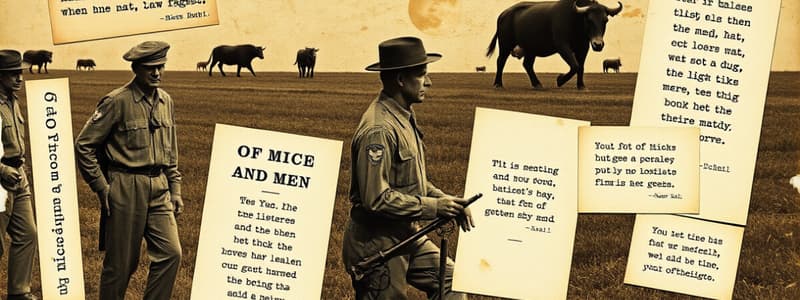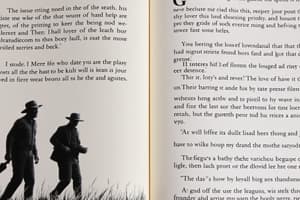Podcast
Questions and Answers
What do George and Lennie's dream of having a place to live represent?
What do George and Lennie's dream of having a place to live represent?
- Their desire for wealth
- Their fear of being alone
- Their acceptance of ranch life
- Their hope for a better life (correct)
What does the phrase 'They had walked in single file down the path' signify?
What does the phrase 'They had walked in single file down the path' signify?
The unequal relationship between George and Lennie.
Lennie's childlike behavior is depicted when he imitates George.
Lennie's childlike behavior is depicted when he imitates George.
True (A)
George's frustration at being Lennie's guardian is clearly stated.
George's frustration at being Lennie's guardian is clearly stated.
What do the other men on the ranch think about George and Lennie's friendship?
What do the other men on the ranch think about George and Lennie's friendship?
'Lennie dabbled his big paw in the water.' 'Like a ______.'
'Lennie dabbled his big paw in the water.' 'Like a ______.'
What does Lennie's phrase 'you've broke it pettin' it' imply?
What does Lennie's phrase 'you've broke it pettin' it' imply?
What does Candy's dog symbolize in the text?
What does Candy's dog symbolize in the text?
Curley is portrayed as a character who feels threatened by larger men.
Curley is portrayed as a character who feels threatened by larger men.
What does Crooks' possession of books in his room indicate?
What does Crooks' possession of books in his room indicate?
Curley's wife is depicted as a sympathetic character.
Curley's wife is depicted as a sympathetic character.
What does George's final act of killing Lennie signify?
What does George's final act of killing Lennie signify?
What does the phrase 'A guy goes nuts if he ain't got nobody' express?
What does the phrase 'A guy goes nuts if he ain't got nobody' express?
Flashcards are hidden until you start studying
Study Notes
Quotes and Themes in "Of Mice and Men"
-
Dream of a Better Life
- "gonna get a little place and live on the fatta' the lan'" represents George and Lennie's aspiration for a brighter future amid the hardships of ranch life, showcasing their desire for escapism.
-
Relationship Dynamics
- "They had walked in single file down the path..." indicates the power imbalance between George and Lennie, with George as the dominant figure reflecting their unequal relationship.
-
Childlike Imitation
- "Lennie...imitated George exactly." illustrates Lennie's childlike behavior and dependence on George, highlighting their familial-like bond.
-
Guardian Frustration
- "If I was alone, I could live so easy." reveals George's irritation about responsibilities as Lennie's caregiver, despite his genuine care for Lennie.
-
Isolation in Ranch Life
- "I ever seen one guy take so much trouble for another guy." underscores the loneliness experienced by ranch workers and the rarity of close friendships.
-
Animal Imagery
- "Lennie dabbled his big paw in the water." employs animalistic comparisons to convey Lennie's strength, innocence, and the perception of him by others.
-
Obedience and Dependence
- "Lennie...obeyed." reinforces the parent-child dynamic in George and Lennie's relationship, illustrating Lennie's reliance on George.
-
Past Troubles
- "They run us outta Weed." hints at Lennie's troubled past, indicating a pattern of problematic behavior that follows him.
-
Setting Significance
- "On one side of the river the golden foothill slopes..." emphasizes the tranquil and beautiful natural setting, contrasting with the harsh realities of the characters' lives.
-
Childlike Responses
- "Lennie's whimpering cry." portrays Lennie's reactions to situations as being reminiscent of a small child, emphasizing his innocence.
-
Unintentional Harm
- "you've broke it pettin' it" signifies Lennie’s unawareness of his own physical strength, leading to accidental harm.
-
Loneliness of Ranch Workers
- "Guys like us, that work on ranches, are the loneliest guys in the world." conveys the deep sense of isolation felt by itinerant workers during the Great Depression.
-
Mutual Dependence
- "Because I got you to look after me..." reflects the reciprocal relationship between George and Lennie, highlighting their emotional reliance on one another.
-
Ageism in Work
- "The old swamper shifted his broom." indicates Candy's long tenure at the ranch and the unremitting nature of labor, regardless of age.
-
Racism and Dehumanization
- "the stable buck's a n*****." illustrates how ingrained racism manifests in the ranch community, dehumanizing Crooks.
-
Social Hierarchy
- "he wore high-heeled boots and spurs to prove he was not a laboring man." the Boss’s distinct attire symbolizes his position and disconnect from the laborers.
-
Foreshadowing Death
- "a drag-footed sheep dog, gray of muzzle..." parallels Candy's dog and foreshadows the fate of characters who become perceived as burdensome.
-
Threatening Posture
- "His arms gradually bent at the elbows..." suggests Curley’s aggressive nature and reflects his boxing background.
-
Insecurity in Power
- "Curley's like a lot of little guys. He hates big guys." demonstrates Curley's insecurity, establishing a connection to the concept of "Napoleon syndrome."
-
Strength vs. Intelligence
- "Lennie's strong and quick and Lennie don't know no rules." highlights Lennie's physical capabilities and cognitive limitations.
-
Sexism and Objectification
- "I think Curley's married...a tart." depicts women in a derogatory light, illustrating common misogynistic attitudes among the men.
-
Solitary Leisure
- "George laid down his cards thoughtfully..." signifies the use of gambling as a reflection of isolation, emphasizing the theme of loneliness.
-
Involuntary Trouble
- "I don't want no trouble." reveals Lennie’s innocent character, inadvertently attracting conflict due to his presence.
-
Curley’s Wife’s Perception
- "She had full, rouged lips..." portrays Curley’s wife as a sexualized figure and reflects societal attitudes towards women.
-
Danger and Awareness
- "I never seen no piece of jail bait worse than her." signals George's early recognition of the potential peril posed by Curley’s wife.
-
Dignity in Work
- "the prince of the ranch" depicts Slim's noble demeanor and respect among the ranch workers, contrasting with their mundane lives.
-
Misunderstood Relationships
- "It just seems kinda funny a cuckoo like him..." reveals Slim's struggle to comprehend the bond between George and Lennie.
-
Genuine Kindness
- "I can see Lennie ain't a bit mean." signifies Slim's insight into Lennie's true nature, contrasting with the perceptions of others.
-
Death Foreshadowing
- "If you...shoot him right in the back of the head..." foreshadows Lennie's tragic end, mirroring the earlier decision about Candy’s dog.
-
Regretful Decisions
- "I'll shoot him for you." emphasizes the weight of Carlson’s offer, which resonates with the theme of mercy killings in the narrative.
-
Shared Aspirations
- "S'pose I went in with you guys." shows Candy’s eagerness to partake in George and Lennie's dream, indicating a sense of belonging.
-
Hopefulness and Determination
- "We'll do her...we'll fix up that little old place..." illustrates the hopeful vision of a shared future as they work toward a common dream.
-
Regret and Responsibility
- "I ought to of shot that dog myself, George." Candy’s reflection on his dog's death foreshadows George’s internal conflict regarding Lennie.
-
Violent Outbursts
- "Curley's rage exploded." captures the turning point of aggression as Curley confronts Lennie, showcasing the escalating tension.
-
Animalistic Fear
- "Lennie covered his face with his huge paws..." Triggers another instance of animal imagery, emphasizing Lennie's vulnerability during confrontation.
-
Power Dynamics
- "Curley was flopping like a fish on a line." illustrates the physical dominance of Lennie over Curley, encapsulating the struggle for power.
-
Complex Characterization
- "Crooks...had books." shows Crooks as an educated character, defying racial stereotypes and highlighting the barriers faced due to segregation.
-
Isolation and Distance
- "Crooks was a proud, aloof man." reflects Crooks's defensive demeanor and his tendency to keep others at a distance.
-
Racial Segregation
- "You've got no right to come in my room." expresses Crooks’ territorial nature, rooted in the racism and discrimination of his era.
-
Loneliness Acknowledgment
- "A guy goes nuts if he ain't got nobody." underscores Crooks' awareness of the detrimental effects of solitude on mental health.
-
Dreams Unfulfilled
- "I seen hunderds of men come by..." signifies Crooks's cynical view on dreams, emphasizing the futility faced by marginalized characters.
-
Social Hierarchy
- "a n***** an' a dum-dum and a lousy ol' sheep." portrays Curley’s wife asserting power over the isolated characters based on their shared lower status.
-
Threatening Racism
- "I could get you strung up on a tree..." highlights the dangerous intersection of race and power dynamics, illustrating the violent threats common in society.
-
Innocence of Tragedy
- "Lennie sat in the hay and looked at a little dead puppy..." reveals Lennie's unintentional consequences of his actions, stemming from his naïveté.
-
Anger and Frustration
- "G** d*** you,' he cried.'Why do you got to get killed?" shows Lennie's emotional volatility and his incapacity to grasp the seriousness of events.
-
Shared Isolation
- "I get lonely." exposes Curley’s wife’s own sense of loneliness, cultivating empathy toward her character.
-
Unfulfilled Aspirations
- "He says he was gonna put me in the movies." exhibits her lost dreams, placing her within the same framework of disillusionment as other characters.
-
Negative Relationships
- "I don't like Curley. He ain't a nice fella." evokes sympathy for Curley’s wife and hints at the negative dynamics of her marriage.
-
Struggles of Intimacy
- "Her feet battered on the hay..." depicts the physical struggle between Lennie and Curley’s wife, culminating in a tragic misunderstanding of intentions.
-
Posthumous Sympathy
- "the meanness and the plannings and the discontent..." signifies the transformation of Curley’s wife after her death, evoking reader sympathy.
-
Frustration and Loss
- "You G** d***amp," he said viciously." Candy's outburst illustrates the crushing impact of loss on the characters' dreams.
-
Return to the Beginning
- "The light climbed on out of the valley." symbolizes the cyclical nature of the story as George returns to a site of
Studying That Suits You
Use AI to generate personalized quizzes and flashcards to suit your learning preferences.




